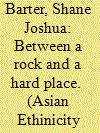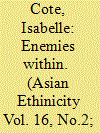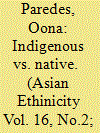|
|
|
Sort Order |
|
|
|
Items / Page
|
|
|
|
|
|
|
| Srl | Item |
| 1 |
ID:
137219


|
|
|
|
|
| Summary/Abstract |
Secessionist movements are often motivated by a sense of exclusion, abuse, and assimilation at the hands of host states. But in waging armed struggles and constructing ethnic nationalisms, they may replicate such grievances against their own minorities. This paper seeks to provide a deeper understanding of how ‘second-order minorities’ respond to secessionist ethno-nationalism. Based on ethnographic research in Aceh, Indonesia, this paper looks to how Javanese, Malay, Alas, and Gayo communities responded to Acehnese secessionism. Aceh’s minorities did not support Aceh’s rebels, opting to flee or resist rebellion. In explaining their reaction, I suggest that the same ethno-nationalist project which united many Acehnese in the secessionist struggle served to repel non-Acehnese communities, leading to ethno-nationalist revivals among Aceh’s minorities and continued tensions in the post-conflict era.
|
|
|
|
|
|
|
|
|
|
|
|
|
|
|
|
| 2 |
ID:
137218


|
|
|
|
|
| Summary/Abstract |
How can we account for the targeted pattern of violence in Xinjiang, in which Uyghur secessionist groups attack some second-order minorities such as the Han Chinese and the Hui, but not the sizeable populations of Kazak, Kyrgyz, and Mongol minorities? Based on a variety of primary and secondary sources, I argue that members of the Han minority, being the national majority in China but a ‘nested minority’ in Xinjiang, are doomed to become a primary target of secessionist attacks as they represent, in and of themselves, the state from which Uyghur nationalists are trying to secede. Han Chinese’s – and to a lesser extent the Hui’s – economic and political dominance over the Uyghurs, along with their lack of historical ties to Xinjiang, also motivates their targeting while reinforcing the bond between other indigenous and comparatively disadvantaged minorities.
|
|
|
|
|
|
|
|
|
|
|
|
|
|
|
|
| 3 |
ID:
137221


|
|
|
|
|
| Summary/Abstract |
Two categories of ethnic minority – Moro and Lumad – are indigenous to the Philippine island of Mindanao, with Muslim Moros outnumbering largely animist Lumads. Both have been profoundly displaced by the post-World War II influx of Christian Filipino settlers from other islands, leading to armed conflict with the national government over land and political control. Due to their political and demographic inferiority to Moros, Lumads have regularly resorted to the accommodation and assimilation of Moro priorities, including throwing their support behind the latters’ decades-long struggle for territorial autonomy. Thanks to wide public support among the Lumad and other Mindanao sectors, the latest peace talks between the government and Moro leaders has led to the signing of a major peace deal involving the creation of a new autonomous Bangsamoro homeland. Despite this, the legitimate needs of Lumad stakeholders have been ignored, and in some cases deliberately undermined, by Moros and the national government. This article analyses the post-conflict status of the Lumad who, as second-order minorities in the future Bangsamoro homeland, have been doubly marginalized in daily life and in the peace process. It concludes that denying Lumad concerns now will render Bangsamoro more vulnerable to legal and constitutional challenges, as well as jeopardize the unique ‘tri-people’ ethos that has made this the most firmly grounded peace process to date.
|
|
|
|
|
|
|
|
|
|
|
|
|
|
|
|
|
|
|
|
|